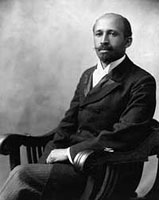Music and the struggle against slavery
Published Feb 4, 2006 7:36 PM
“Little of beauty has America given
the world save the rude grandeur God himself stamped on her bosom; the human
spirit in this new world has expressed itself in vigor and ingenuity rather than
in beauty. And so by fateful chance the Negro folk song—the rhythmic cry
of the slave—stands today not simply as the sole American music, but as
the most beautiful expression of human experience born this side of the
seas.”
—W.E.B. Du
Bois
These words, like the music that they hearken to, were
born of degradation and struggle—the former, inevitably, giving rise to
the latter as human possibilities have and will always give rise to a fight-back
spirit.
In DuBois’ classic book, “The Souls of Black
Folk,” in the chapter titled “Sorrow Songs,” he writes about
the religious melodies that were created by Southern slaves and how those songs
spoke of justice and a perception that slave and master would one day meet, with
the old realities tossed aside, and that their meeting would be as
equals.
|
Former slave learning to read
in 1870.
|
Black religious music has been thoroughly studied throughout the
history of this country, but what is less talked or written about is the defiant
nature of many of these songs. Religion is the “opiate of the
masses” as Karl Marx wrote in the 19th century, in most cases creating an
invisible entity or entities above and beyond the human world and putting the
possibilities of future societies in the hands of those entities.
Religion under Western-dominated class society has generally disempowered
workers and oppressed peoples. In particular, during the period of U.S. slavery,
the white masters figured out that the slaves would always desire and fight for
freedom and equality unless they could be convinced that they were inferior to
whites and be diverted to look for solutions within a mythical world instead of
spontaneous and organized mass uprisings.
Hence, a conscious decision was
made by the slave masters to teach their racist view of religion to the slaves.
Slaves were violently denied real education and were forcefully indoctrinated
with the religion of their murderous, slave-holding captors under the guise of
Christianity.
Despite the mental and physical brutality of slavery, if one
were to look at some of the slave songs, “Oh Freedom” for instance,
and study the words, they reveal the resolve of the throngs of African slaves in
North America. The song starts with: “Oh Freedom, Oh Freedom, Oh Freedom
over me, and before I be a slave, I’ll be buried in my grave…”
These words speak of a fighting spirit and history attests to this.
The
music of Black people in the U.S. was created during slavery. The field holler
started as a way of communicating with other slaves, and later became a vehicle
to pass away the brutal conditions of work in the field under the lash, later
evolving into a rhythmic syncopation. This tradition of song was brought over
from Africa, where song and dance were seldom used for entertainment but as a
part of ritual ceremonies.
The plantation masters forbade the slaves from
holding on to their African culture, making sure to split up tribal affiliations
using slave auctions, but some West African cultures were similar enough, and
the resolve of the Africans was greater than the brutality of the slave
masters.
The music was often coded when it was used for communication, and
this was one of the many ways that illuminate the defiance of the slaves. Just
as some historians have purposely tried to paint the slaves as meek and docile,
history can only be obscured for so long.
Many slave rebellions took
place. Gabriel Prosser and others planned a rebel lion in Virginia in 1800 and
Charles Deslondes in the same year led an uprising; Denmark Vesey and a large
number of enslaved men and women planned a rebellion in Charleston, N.C., in
1822; Nat Turner and his rebels killed over 50 slave masters in Southampton,
Va., in 1831, and there was the multi-racial attack on Harper’s Ferry in
1859 led by John Brown. Along with these rebellions there were work stoppages
and everyday acts of defiance.
Black music has been defined by the
struggle for freedom and self-determination, from the defiant sorrow of
anti-slavery songs like “Oh Freedom” to Grand master Flash and the
Furious Fives’ rap song, the “Message.”
Articles copyright 1995-2012 Workers World.
Verbatim copying and distribution of this entire article is permitted in any medium without royalty provided this notice is preserved.
Workers World, 55 W. 17 St., NY, NY 10011
Email:
[email protected]
Subscribe
[email protected]
Support independent news
DONATE


